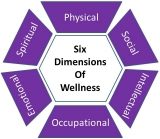Dimensions of Wellness
The definition of wellness, long used by the National Wellness Institute, is consistent with these dimensions. Wellness is an active process through which people become aware of, and make choices towards, a more successful existence.

Emotional
One who accepts theirs and others emotions and feelings and relates to them in a positive and enthusiastic way. This dimension involves feeling positive and enthusiastic about ourselves and life, in general. Development in this dimension includes recognition of feelings and the ability to manage feelings, being able to develop autonomy, maintain satisfying relationships and the ability to cope with stress. Being aware of and accepting a wide range of feelings about yourself and others.
Intellectual
One who stimulates intellectual growth, mental activities, appreciates creativity and shares it with others. Intellectual wellness encourages continued learning, problem solving and creativity. This dimension involves improving verbal skills, keeping abreast of social and political issues and reading books, magazines, and newspapers.
Occupational
One who works in an environment where you contribute your talents and skills in a meaningful, rewarding and gratifying way. Occupational wellness is the ability to achieve a balance between work and leisure time, addressing workplace stress and building relationships with co-workers. It focuses on our search for a calling and involves exploring various career options and finding where you fit. Because what we do for a living encompasses so much of our time, it’s important for our overall well-being to do what we love and love what we do. When people are doing what they were meant to do, they deepen their sense of meaning and purpose.
Physical
One who understands and practices physical activity, eating balanced meals and avoiding harmful practices. Physical wellness encourages participation in regular physical activities which improve cardiovascular strength and endurance, flexibility and muscular strength. This dimension involves understanding and appreciating the relationship between sound nutrition and how the body performs. It involves practicing medical self-care for minor illness and knowing when professional medical attention is needed. The physical benefits of looking good and feeling great often lead to psychological benefits of enhanced self-esteem, self-control, determination and stronger sense of direction.
Social
One who contributes to the environment and community, improve personal relationships and meaningful friendships. This dimension encourages taking an active part in improving the community by supporting a healthy living environment and initiating better communication with others. This includes contributing time and/or money to community projects, participating in recycling and other conservation efforts and developing harmony within your family. Becoming more aware of your importance in society, improving our world by encouraging healthy lifestyles and initiating better communication with those around you.
Spiritual
One who is in a peaceful harmony with in one’s self through their path of life. This dimension involves seeking meaning and purpose in human existence. Development in this dimension includes developing a deep appreciation and acceptance for things that cannot be completely understood. It involves the tolerance of values and beliefs of others and participating in activities that are consistent with personal values.